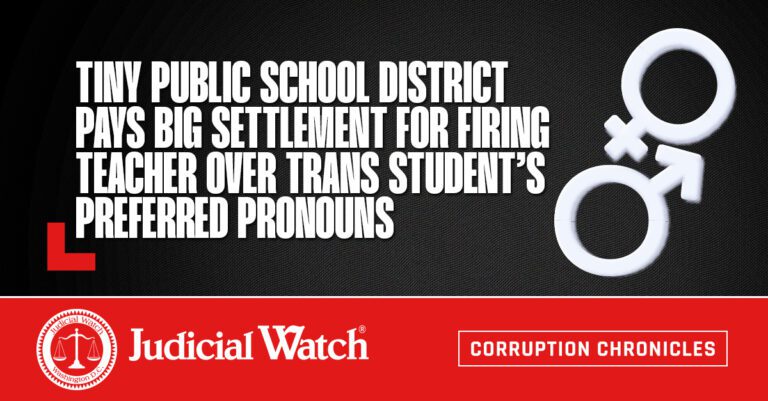
Tiny Public School District Pays Big Settlement for Firing Teacher over Trans Student’s Preferred Pronouns

In an example of how publicly funded entities are wasting taxpayer dollars to accommodate the transgender population, a public school district is paying over half a million dollars in damages as well as legal fees to settle a case involving a teacher it fired for refusing to use a student’s preferred pronouns. The high school French teacher, Peter Vlaming, worked in Virginia’s West Point Public Schools for about seven years and was fired back in 2018 because he would not use masculine pronouns when referring to a biological girl who identified as a boy. The teacher did, however, try to accommodate the student by using the new proper male name she chose for her “transition” to a boy but that was not enough to spare his job.
Administrators in the tiny school district with 813 students and just two campuses—an elementary school and a middle/high school—told the teacher that not using the student’s masculine pronouns violated the district’s nondiscrimination policy and issued a warning before terminating him. In 2019 a conservative nonprofit filed a lawsuit against the school board on Vlaming’s behalf arguing that school and district officials violated Virginia’s constitution and state law by firing the veteran teacher for exercising his rights to free speech and exercise. The case is not just about pronouns, the complaint stated. “It is about whether the government may force Mr. Vlaming to express ideas about human nature, unrelated to the school’s curriculum, that he believes are false. If he were to comply with Defendants’ demands, he would be forced to communicate that gender identity, rather than biological reality, fundamentally shapes and defines who we truly are as humans, that our sex can change, and that a woman who identifies as a man really is a man.”
The female student was in Vlaming’s Exploratory French Class during the 2016-17 school year and in his French I class in 2017-18. She began identifying as a male towards then end of her second year in his class, according to the complaint. Vlaming met with the girl’s mother and accommodated her by agreeing to use her new masculine proper name, though it was not legally changed. The teacher got in trouble for using the wrong pronouns when the student was not present. The administration gave Vlaming documents published by transgender political advocacy groups and told him that he was potentially violating federal law and school board policy by not using the student’s preferred pronouns. The school’s assistant principal ordered the teacher to use male pronouns, or his job could be at risk. Vlaming refused saying it was against his religious beliefs to use male pronouns to refer to a female. After a few more meetings he was terminated and slapped with a letter of reprimand formally charging him with non-conformity with school board policy for not using male pronouns when referring to the girl. The school board subsequently voted, unanimously, to terminate his employment for violating its policies against discrimination and harassment based on gender identity.
A judge in King William County Circuit Court dismissed Vlaming’s lawsuit and he appealed to the Virginia Supreme Court, which reinstated the case and led to a settlement. In its opinion the appellate court wrote that Virginia’s Constitution contains robust free speech and free exercise protections for public employees. “Absent a truly compelling reason for doing so, no government committed to these principles can lawfully coerce its citizens into pledging verbal allegiance to ideological views that violate their sincerely held religious beliefs,” the opinion, issued in December 2023, states. Jolted into seeing the writing on the wall, the West Point School Board recently agreed to pay Vlaming $575,000 in damages as well as attorneys’ fees. The school board also cleared the French teacher’s firing from his record and agreed to conform with state education policies that respect fundamental free speech. “I loved teaching French and gracefully tried to accommodate every student in my class, but I couldn’t say something that directly violated my conscience,” Vlaming said in a statement issued by his legal team.
















